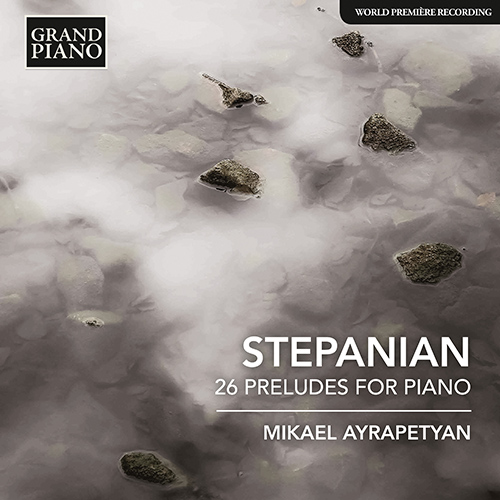
About this Release
“Armenian classical music is unique. My job as the head of the international musical project "Secrets of Armenia" is to introduce masterpieces of Armenian classical music to a worldwide audience, and I’m very happy to be able to do that with these recordings. Art should not remain in oblivion.” — Mikael Ayrapetyan
STEPANIAN, HARO (1897–1966)
26 Preludes for Piano
- Mikael Ayrapetyan, piano
Described by Aram Khachaturian as “the greatest Soviet Armenian composer”, Haro Stepanian followed the pioneering efforts of composers such as Komitas in establishing a strong national voice for Armenian music. He composed three symphonies, operatic works, numerous songs, chamber pieces, and works for piano. Building on the models of Chopin, Rachmaninov and fellow Armenians such as Komitas and Tigranian, the 26 varied and sharply contrasting Preludes are exquisite folk-influenced
miniatures suffused with sadness, poetic contemplation, the natural world and scenes of Armenian life.
Tracklist
|
8 Preludes, Op. 47 (1947) (00:55:35 )
|
|
1
No. 1 in G Minor (00:02:52)
|
|
2
No. 2 in A Major (00:01:37)
|
|
3
No. 3 in F Minor (00:02:33)
|
|
4
No. 4 in F-Sharp Minor (00:01:41)
|
|
5
No. 5 in G Major (00:01:59)
|
|
6
No. 6 in F Minor (00:02:29)
|
|
7
No. 7 in C Minor (00:03:06)
|
|
8
No. 8 in F-Sharp Minor (00:01:43)
|
|
8 Preludes, Op. 48 (1948) (00:17:03 )
|
|
9
No. 1 in E Minor (00:01:41)
|
|
10
No. 2 in C Minor (00:02:30)
|
|
11
No. 3 in A Major (00:02:15)
|
|
12
No. 4 in A Minor (00:01:42)
|
|
13
No. 5 in F Minor (00:01:59)
|
|
14
No. 6 in F-Sharp Minor (00:02:37)
|
|
15
No. 7 in G Minor (00:02:20)
|
|
16
No. 8 in F Major (00:01:59)
|
|
8 Preludes, Op. 63 (1956) (00:14:32 )
|
|
17
No. 1 in E Minor (00:02:01)
|
|
18
No. 2 in G Minor (00:01:29)
|
|
19
No. 3 in F-Sharp Major (00:01:52)
|
|
20
No. 4 in A Minor (00:01:23)
|
|
21
No. 5 in B Minor (00:02:31)
|
|
22
No. 6 in B Minor (00:01:18)
|
|
23
No. 7 in B Major (00:02:01)
|
|
24
No. 8 in G Minor (00:01:57)
|
|
25
Prelude in A Major (1964) (1964) (00:02:41)
|
|
26
Prelude in F Minor (1965) (1965) (00:02:30)
|
The Artist(s)
 Mikael Ayrapetyan is a pianist, composer, producer and teacher, as well as a researcher and public figure. He has done much to popularise Armenian classical music all over the world with his Secrets of Armenia musical project, which began during his studies at the Moscow Conservatory. Born in 1984 in Yerevan, Armenia, he studied at the Moscow Tchaikovsky State Conservatory, and continues to uphold the performing traditions of the Russian piano school, of which Konstantin Igumnov, Samuel Feinberg and Lev Oborin are luminaries. His repertoire ranges from the Baroque to the contemporary and includes rarely performed works by Armenian composers. This period was the start of his extensive concert activity in which he performs works by Tigranian, Chukhadjian, Komitas, Melikian, Spendiarian, Barkhudarian, Stepanian, Khachaturian, Babajanian, Arutyunian, Abrahamian, Bagdasarian, Avetisian, Mirzoyan, Amirkhanian and many other Armenian composers, which eventually led him to produce his own concerts. He was awarded the State Prize of the Republic of Armenia for his outstanding contribution to the development and popularisation of Armenian classical music.
Mikael Ayrapetyan is a pianist, composer, producer and teacher, as well as a researcher and public figure. He has done much to popularise Armenian classical music all over the world with his Secrets of Armenia musical project, which began during his studies at the Moscow Conservatory. Born in 1984 in Yerevan, Armenia, he studied at the Moscow Tchaikovsky State Conservatory, and continues to uphold the performing traditions of the Russian piano school, of which Konstantin Igumnov, Samuel Feinberg and Lev Oborin are luminaries. His repertoire ranges from the Baroque to the contemporary and includes rarely performed works by Armenian composers. This period was the start of his extensive concert activity in which he performs works by Tigranian, Chukhadjian, Komitas, Melikian, Spendiarian, Barkhudarian, Stepanian, Khachaturian, Babajanian, Arutyunian, Abrahamian, Bagdasarian, Avetisian, Mirzoyan, Amirkhanian and many other Armenian composers, which eventually led him to produce his own concerts. He was awarded the State Prize of the Republic of Armenia for his outstanding contribution to the development and popularisation of Armenian classical music. The Composer(s)
 Stepanian trained in Moscow, at the Gnessin Music College, from 1923–26, where his fellow pupils included Aram Khachaturian (1903–1978). He subsequently joined the composition class of Vladimir Shcherbachov at the State Conservatory in Leningrad (St Petersburg). Stepanian began teaching at the State Conservatory in Armenia’s capital, Yerevan; and by the late 1930s he was the chairman of the organising committee of the Armenian Union of Composers. He became increasingly interested in the folk music of his own country, and undertook a number of expeditions to collect musical samples from around Armenia. ‘I fell in love with Armenian folk music,’ he explained, ‘as one loves one’s mother, one’s friend or one’s beloved. In it I heard the voice of the heart and soul of my native country, the echoes of historical storms, sorrows, joys and hopes, anger and dreams of my people. Throughout my life I looked upon it as if it were a living being.’ His work in this area was greatly admired, and Khachaturian (with whom he remained close friends) wrote to him in 1953, ‘I think you are the greatest Soviet Armenian composer, whose merits before the native art are really great.’
Stepanian trained in Moscow, at the Gnessin Music College, from 1923–26, where his fellow pupils included Aram Khachaturian (1903–1978). He subsequently joined the composition class of Vladimir Shcherbachov at the State Conservatory in Leningrad (St Petersburg). Stepanian began teaching at the State Conservatory in Armenia’s capital, Yerevan; and by the late 1930s he was the chairman of the organising committee of the Armenian Union of Composers. He became increasingly interested in the folk music of his own country, and undertook a number of expeditions to collect musical samples from around Armenia. ‘I fell in love with Armenian folk music,’ he explained, ‘as one loves one’s mother, one’s friend or one’s beloved. In it I heard the voice of the heart and soul of my native country, the echoes of historical storms, sorrows, joys and hopes, anger and dreams of my people. Throughout my life I looked upon it as if it were a living being.’ His work in this area was greatly admired, and Khachaturian (with whom he remained close friends) wrote to him in 1953, ‘I think you are the greatest Soviet Armenian composer, whose merits before the native art are really great.’ Reviews
“The young Armenian pianist Mikael Ayrapetyan is a very fine advocate for this decidedly obscure music. ” – Fanfare
“Mr Ayrapetyan plays them with a wide palette of tonal color, fine virtuosity, and consummate musicianship. ” – American Record Guide
“The Grand Piano engineers conspire with happy results in rendering Ayrapetyan’s admirable way with chiming charms and epic rhetoric. ” – MusicWeb International

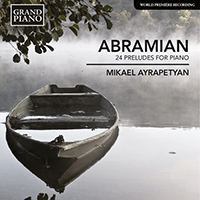
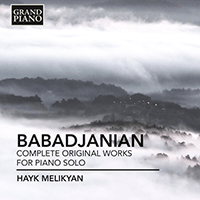
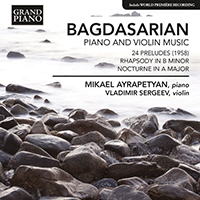
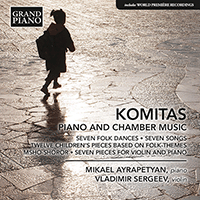
 Grand Piano has gained a reputation for producing high quality recordings of rare keyboard gems. Dedicated to the exploration of undiscovered piano repertoire, the label specialises in complete cycles of piano works by many lesser-known composers, whose output might otherwise have remained unknown and unrecorded.
Grand Piano has gained a reputation for producing high quality recordings of rare keyboard gems. Dedicated to the exploration of undiscovered piano repertoire, the label specialises in complete cycles of piano works by many lesser-known composers, whose output might otherwise have remained unknown and unrecorded.






